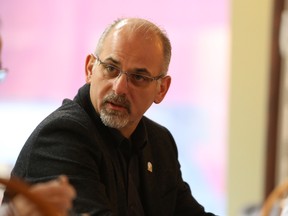Municipal election reforms coming?

Article content
Municipal leaders express mixed reaction to slew of reforms being proposed by the Kathleen Wynne government aimed at changing the way people vote in municipal elections.
The Grits have already made it clear that they are seeking municipal support to phase out the first-past-the-post voting system.
Even more pressing is the Liberals agenda to scale back what Ted McMeekin, Ontario’s municipal affairs and housing minister, has labelled as a lengthy and unnecessary municipal election time frame, under which some candidates file as early as Jan. 1an. 1, launching a campaign that rolls on until election day in October.
Plans are underway for the government to start consulting with towns and cities this fall with an agenda to get the reforms up and running for the fall 2018 election.
Mayor Taso Christopher said it's premature to toss the current first-past-the-post, where whoever gets the most votes wins, in exchange for ranked ballots, where voters select candidates in order of preference.
“I wouldn't anticipate something happening by the next election unless they execute it a the provincial level,” Christopher said of the proposed changes. “It will be a long time yet before we see any of those changes into effect. We'll see how that rolls out.”
He does acknowledge the government concerns about vote splitting and candidates getting into office with meagre margins, in some cases less than 20 per cent support.
In the Belleville's case, vote splitting was definitely an issue underscored by several candidates. Christopher and six other mayoral contenders battled for ballots cast by just 44.7 per cent of eligible electors voting. Christopher scored 3,914 votes to runner-up Pat Culhane’s 3,753, or 25.98 per cent to 24.91 per cent.
“I don't think the system is broken,” Christopher said. “Someone has to figure out how to get more people out to vote. I'm flabbergasted that people don't exercise their right.”
If anywhere we have failed has as a province and federal government, is to find the tools to get people to come out and vote,” he said.
Under the ranked ballot system, a candidate gets a majority of first-place votes, the one with lowest support is knocked out of the race and their second-place votes redistributed to the remaining contenders. The runoff continues until there is a winner with majority support.
The ranked ballot approach won't be suitable for municipals the size of Goderich, said its Mayor Kevin Morrison.
“They have to take a look at that real close,” Morrison said. “We have a population of 7,200 and those people like coming out to the poles.”
Things like internet voting haven't caught on with Goderich voters, he said.
“It didn't work,” he said. “We had such an outburst about that.”
“They're trying to get younger people to vote, but the ranking system, I just don't think that's fair democratic way to decide who you're going to vote for,” he said.
It might be time for a rethink of the current system said Graydon Smith, the mayor of Bracebridge.
A level of reform and taking a look at the system is certainly warranted,” Smith said. “Everything becomes stale overtime.
Doesn't go to say that I totally reject the first-past-the-post notion but it certainly should be examined.”
He was fortunate to gain 90 per cent of the vote in the last election, establishing what he said is a clear mandate from the people to carry forward. This is my second term as mayor.
It's not a one size fits all system.
“In other communities it's different and the demand may be higher for a different system and that's why we need that dialogue with the province.
Jason.miller@sunmedia.ca